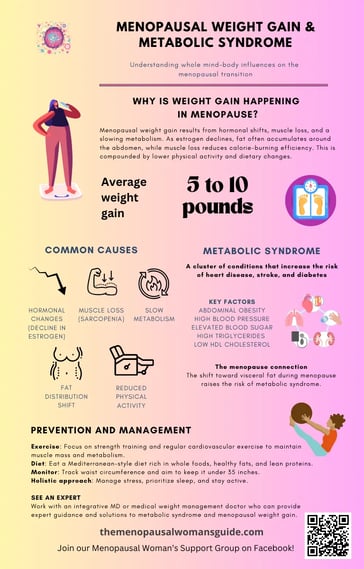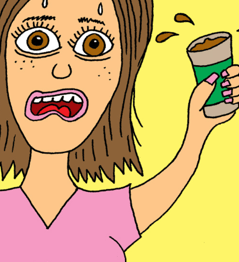Weight Gain in Menopause: How Much to Expect
MENOPAUSAL SYMPTOMSMENOPAUSAL DEPRESSION
Kennerly Clay
8/26/20246 min read


What is the average weight gain during menopause?
Whether you've struggled with weight your entire life or you're suddenly noticing the pounds creep on in perimenopause, chances are you'll gain some weight in menopause. But how much, and what to do about it? Read on.
Wondering if you're destined to pack on the pounds or if you'll be able to keep the weight gain at bay? Weight gain is one of numerous contributing factors to depression in menopause, along with hot flashes, insomnia, brain fog and mood swings associated with mental health in menopause. (Who wouldn't feel depressed with all that bloating and bulging and batshitcrazyness?) Here's what's happening to your body in menopause - and why the weight gain.
How much weight gain are we talking about?
A longitudinal study conducted by the Study of Women’s Health Across the Nation (SWAN), which has followed more than 3,000 women for over two decades, found that women gained about 1.5 pounds per year during menopause, typically between the ages of 45 and 55. These findings are consistent across diverse populations, making it a pretty reliable gauge of what you might expect.
My own experience with rapid perimenopausal weight gain began when I was 45 years old. I was going to the gym, doing high-energy workouts three or four times a week. In spite of my efforts, I packed on 25 pounds in what felt like a sudden burst of weight gain over several months. And we're not talking lean muscle mass weight gain, but full-on, too-fat-to-fit-in-your clothing weight gain. I was stunned and baffled. So began my menopausal journey and newfound awareness that things were changing, in what I perceived to be pretty shitty ways.
Menopausal weight gain and metabolic syndrome
Get the whole mind-body picture with this infographic about the causes of weight gain and the key factors involved in metabolic syndrome in menopause.


Why does menopause lead to weight gain?
Menopausal weight gain is influenced by the complex interplay between hormonal shifts, muscle loss, and a slowing metabolism. As estrogen levels decline during menopause, fat distribution changes, often resulting in increased abdominal fat. Simultaneously, age-related muscle loss reduces the body’s ability to burn calories efficiently, leading to a slower metabolism. This metabolic slowdown is further compounded by lifestyle factors such as decreased physical activity and changes in diet. (I don't know about you, but deadening fatigue, brain fog, and low mood were the perfect environment for feeling like doing absolutely nothing. No wonder activity levels change when you can hardly get out of bed to face another day.)
Estrogen levels drop during menopause, and since estrogen helps regulate fat distribution, particularly around the hips and thighs, you may notice that your fat tends to accumulate more in the abdominal region.
Shifting fat distribution is one of the key drivers of that notorious “menopausal belly.” But don’t just point fingers at estrogen. Other culprits include age-related muscle loss (also known as sarcopenia) and a slowing metabolism. After all, as we age, our bodies naturally lose muscle mass, which leads to fewer calories burned at rest.
Menopause survival tip sheet
The Menopause Madness Relief Kit is a hand-curated list of menopausal survival tips from women who've been to hell and back.


"About 2 years prior to the final menstrual period...the rate of fat gain doubled and lean mass started to decline. Fat gains and lean losses continued until 2 years after the final menses... In postmenopause, the trajectories of fat and lean mass became 'flat' – there were no gains or losses." - Changes in Body Composition and Weight During the Menopause Transition, SWAN
Does everyone gain weight during menopause?
No, not everyone will gain weight during the menopausal transition. While weight gain is common, it’s not inevitable. While many women experience some level of weight increase, others manage to maintain their weight or even lose weight during menopause. According to the National Institute on Aging, factors such as genetics, lifestyle, and overall health play a significant role in how your body changes during menopause.
The SWAN study, mentioned earlier, highlights that women who maintain an active lifestyle and eat a balanced diet are less likely to experience significant weight gain. So, while menopause may make it a bit more challenging to maintain your weight, it’s not a guaranteed sentence. Consistency with physical activity, particularly strength training, and a diet rich in whole foods can make a big difference.
All that being said, if you're reading this article and you're struggling with insane weight gain during menopause, it's not because you're not working hard enough or you're sitting around eating bon-bons on the sofa. Your body has changed. There's a whole metabolic situation going on that conspires to pack on the pounds. In my experience, nothing I did made a difference - until I finally sought out medical weight management. Working with a weight loss doctor, a nutritionist, and lifestyle support specialist, with the assistance of weight loss medications (e.g., Wegovy, Ozempic) is what finally got my weight under control.
Is menopause weight gain dangerous?
The good news is that moderate weight gain during menopause is not inherently dangerous. However, where that weight is gained matters. As we mentioned earlier, menopause often leads to an increase in abdominal fat, and that’s the fat that health professionals are more concerned about. Excess belly fat, also known as visceral fat, is associated with an increased risk of heart disease, type 2 diabetes, and certain types of cancer.
A waist measurement of more than 35 inches for women is considered a risk factor for various health issues. So, even if you only gain a few pounds, paying attention to where those pounds are distributed is crucial for your long-term health.
What can you do about it?
Strength training and regular exercise are your best friends. Building and maintaining muscle mass can help counteract the metabolic slowdown that comes with aging.
I've found that Pilates meets my need for core strength and conditioning and maintenance of lean muscle mass. It's also an activity that's relaxing. I love the stretching exercises and I enjoy lying down for a good part of each class. That's because I'm lazy! I am not a gym rat. I'm not going to run a 5K. I'm not interested in sweating or working hard. I'm too old for that shit and it bores me.
In addition to exercise, of course paying attention to diet is critical. In general, a Mediterranean-style diet, rich in fruits, vegetables, whole grains, lean proteins, and healthy fats like olive oil and nuts, serves the menopausal woman well. Not only does this type of diet help manage weight, but it also supports heart health—an important consideration during the post-menopausal years.
So, what’s the takeaway?
Yes, the average weight gain during menopause hovers around 5 to 10 pounds, but that number can vary depending on several factors, including your lifestyle, diet, and genetic predispositions. I gained 25 pounds in a flash and I've talked to plenty of women who experienced something similar.
But don't give up on yourself. This type of weight gain doesn’t have to be permanent or dangerous if managed properly. If the preventive and maintenance measures you're taking to manage diet, exercise and lifestyle aren't sufficient, don't be too proud to seek out professional weight management from a qualified, trusted MD who specializes in metabolic syndrome. There are many things beyond our control when it comes to menopause. What our bodies have "become" over the course of many decades, and the complexities of physiological changes, may require expert insight and treatment.
Connect further on weight gain in menopause
Books for women who are losing it in menopause
Mental Health
Losing your mind in peri/menopause?
The menopausal woman's guide series
Financial Health
Had enough of financial insanity?
Personal Growth
Triggers? Old stuff kicking up?
Related topics
Explore helpful articles, tips, and advice for women who are losing their shit in menopause.
Community
Stay Connected
© 2024. Eclectic Content, Inc. All rights reserved.






